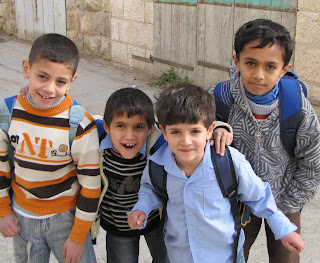 Imagine ghost town. Set in the old Western style with tumbleweeds spinning down the street, two men step out into the empty road. Pistols are drawn. The shadows hold their breaths.
Imagine ghost town. Set in the old Western style with tumbleweeds spinning down the street, two men step out into the empty road. Pistols are drawn. The shadows hold their breaths. Freeze
Replace the western façade with stone; the windows are welded shut instead of boarded up. Tumbleweeds morph into black plastic bags and Coca Cola bottles. The two men hold machine guns and dress in military attire. They point their weapons, not at each other, but instead at the shadows.
Hebron is a sizable city in the West Bank of Palestine and is the only city in the Palestinian territories divided internally by Israeli settlements. The central road, once bustling with trade and commerce is not closed to all Palestinians. People are kept from stepping out their front door, stepping onto their roofs, or even securing a lock. Some houses must be accessed through systems of ladders that extend across roofs through other people’s courtyards.
The street that is closed (only to Palestinians) is patrolled by Israeli soldiers. A once simple skip across the street now takes over 30 minutes to loop around the restricted areas. Doors of the old market have been welded shut to prevent use and traditional alleyways have been bricked up to restrict local movement. The streets are empty except for the occasional Jewish family strolling on a visit to the synagogue.

With the recent events of the Middle East papering the background of Palestinian lives with images of non-violent resistance and large scale liberation, the Palestinians of Hebron are beginning to react to their own oppressed situation. A few days after I left the country at the beginning of February, tension between the Palestinians and the Israelis was growing. Weekly gatherings of Muslims around the Abraham Mosque appeared to make the Israeli soldiers nervous. The soldiers practiced crowd dispersal techniques and detained several young men who were trying to help elderly family members.
However, it has only been over the past few days
An estimated one thousand Palestinians, joined by Israeli and international activists, took to the streets on Friday (February 25) to demand the opening of Shuhada (Martyrs) Street, a former thoroughfare in the West Bank city of Hebron. Israeli occupying forces fired foam-tipped bullets, tear gas, and sound grenades resulting in the serious injury of nine protestors, in addition to the many who suffered the adverse effects of tear gas inhalation.

Friday’s protest marked the 17th anniversary of Baruch Goldstein’s massacre of 29 Palestinians who were praying in Hebron’s Ibrahimi Mosque. Following the 1994 massacre, Shuhada Street – a main artery serving the Old City of Hebron as well as the Ibrahimi Mosque – was closed to Palestinian traffic. No Palestinian cars, nor Palestinian themselves are permitted on Shuhada Street; whereas, Israeli settlers are permitted to travel freely while under the protection of the Israeli military. Many Palestinians whose homes are located on Shuhada Street are not able to use their front doors. Some residents of Shuhada Street are forced to use ladders connected to neighboring roofs in order to leave their homes. (for the whole article see link)
No comments:
Post a Comment